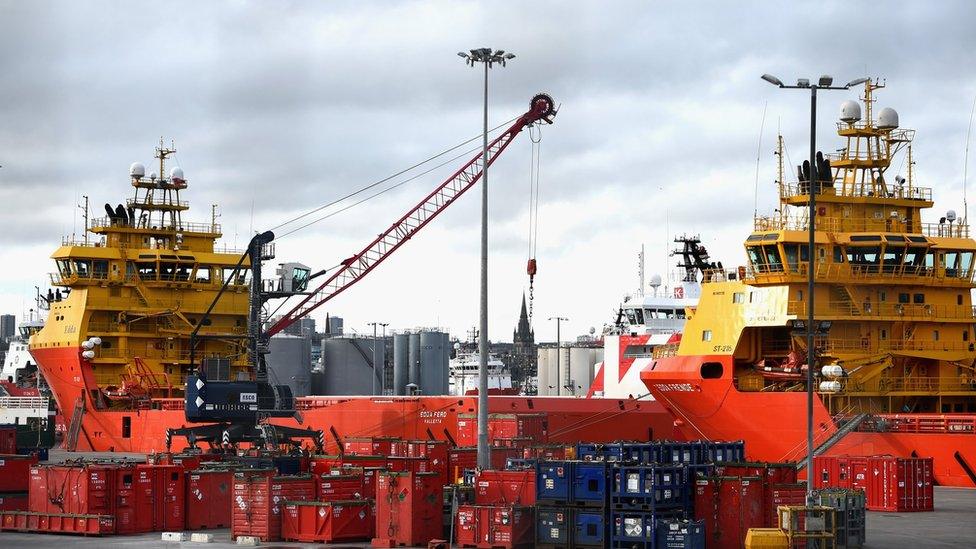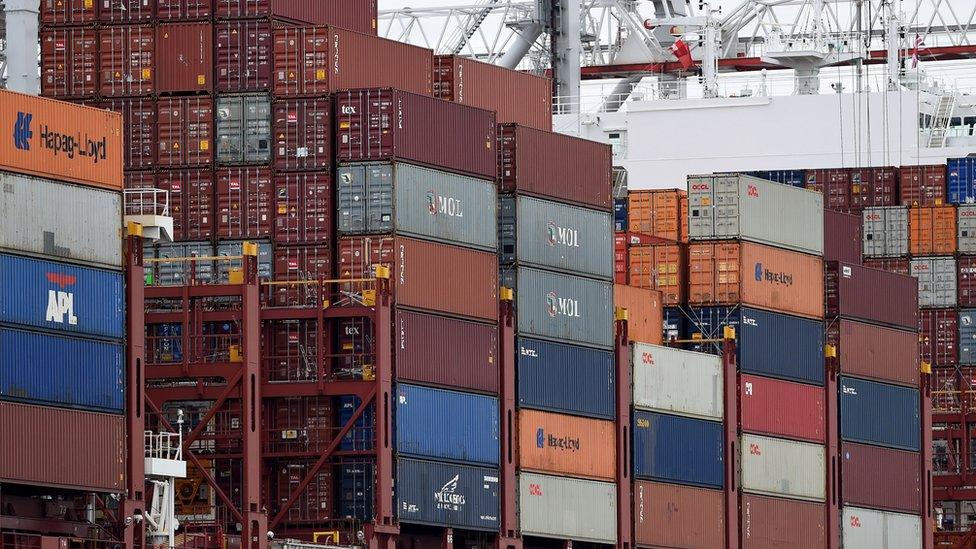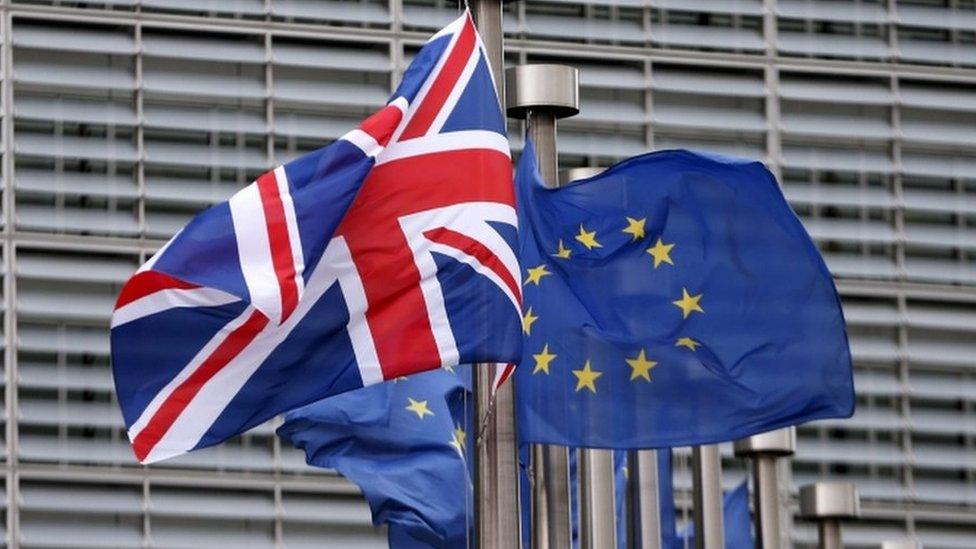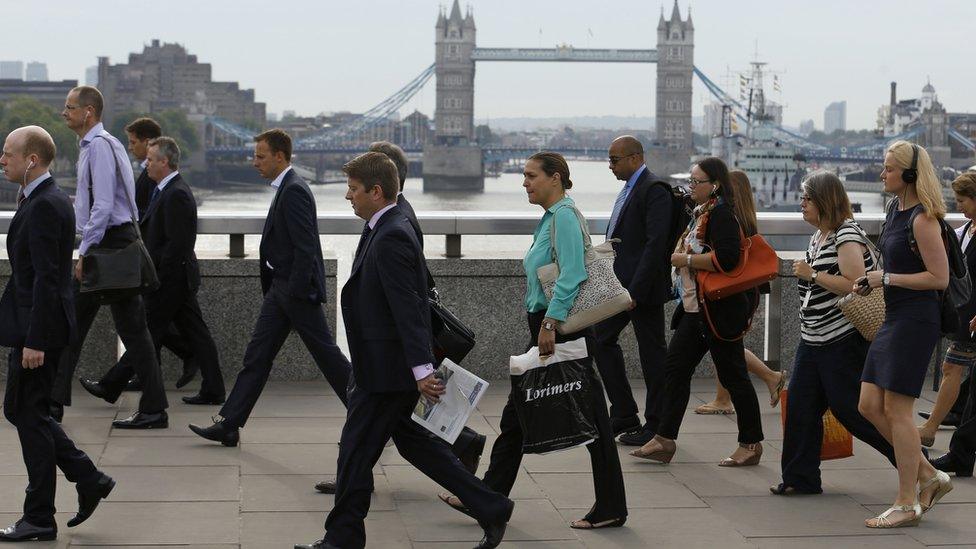UK current account deficit at new high
- Published

The UK's current account deficit widened to a record high in the final quarter of last year.
The deficit in the three months to December was £32.7bn, the equivalent of 7% of GDP in that quarter, said the Office for National Statistics (ONS).
For all of 2015, it came to £96.2bn or 5.2% of annual GDP. Both figures were the highest since records began in 1948.
A current account deficit means the value of imports of goods, services and investment income exceeds exports.
At the same time, ONS figures, external showed the UK economy grew 0.6% in the fourth quarter of 2015, higher than previous estimates of 0.5%.
As a result, the economy grew by 2.3% for the whole of 2015, rather than 2.2% as previously thought.
The upgrade to the growth figure came as a surprise to analysts, who had forecast that it would remain unchanged.
The ONS said the revision in GDP was caused by a stronger performance in the services sector and a smaller contraction in industrial production.


Analysis: Andrew Verity, BBC economics correspondent
Deficits are all about more money going out than coming in. Unlike the budget deficit, the one the government has pledged to wipe out by 2020, the current account refers to the country as a whole, private and public.
It includes the trade deficit - the fact that we buy far more goods and services from other countries than we sell to them. But it also includes other payments, from the dividends that profitable companies such as Jaguar Land Rover send back to their foreign owners to the money paid to employees abroad by British companies.
A note of caution: these numbers wobble around. Having said that, at £96.2bn, or 5.2% of the size of the whole economy (GDP), the current account deficit for 2015 was the biggest deficit on record, the largest for 67 years.
Here's the problem. If more money is flowing out than flowing in, companies and governments have to borrow from abroad to make up the difference. That's fine, so long as there's confidence in the UK's economic future. Companies can borrow by issuing bonds, paying modest rates of interest (as can governments) and foreign investors will gobble them up.
But if confidence takes a knock - if, for example, there's a sterling crisis or other economic shock - then those foreign investors may be a little more reluctant to buy those bonds. In which case, those foreign investors may demand higher interest rates, which may well get passed on. Now can anyone think of any scenarios like that?

Stability fears
Earlier this week, the Bank of England's Financial Policy Committee warned that uncertainty over the UK's membership of the EU posed risks to financial stability, with implications for the current account deficit.
It has said it will watch for indications that the outcome of the referendum on 23 June could make it more difficult to finance the deficit.
The ONS said the deficit had widened because income from the UK's direct investments abroad had fallen, while payments to foreign investors in the UK had risen.
Chancellor George Osborne said the rise in the current account deficit meant the UK should not be contemplating leaving the EU.
"Today's figures expose the real danger of economic uncertainty and show that now is precisely not the time to put our economic security at risk by leaving the EU," he said.
'Horrible' figures
Howard Archer, chief UK and European economist at IHS Global Insight, described the fourth-quarter current account figures as "truly horrible" and "a particularly uncomfortable development for the UK economy".
"While the markets have so far taken a relatively relaxed view of the UK's elevated current account deficits, it could become an increasing problem if the markets lose confidence in the UK economy for any reason - especially given the size of the fourth-quarter 2015 shortfall," he added.
"This would make it harder for the UK to attract the investment inflows that it needs to finance the current account deficit and could weigh heavily down on sterling.
"An obvious potential trigger for the markets losing confidence in the UK economy could be a vote to leave the EU in the 23 June referendum."
However, Matthew Elliott, chief executive of Vote Leave, said: "These figures blow a hole in the Remain campaign's key tactic: to do down Britain and wrongly suggest that we can't get a free trade deal after we say no to Brussels.
"It is in the EU's interests to strike a deal with the UK, which is why they will be banging down the door for one when we vote Leave."
- Published29 March 2016

- Published22 March 2016

- Published16 March 2016
